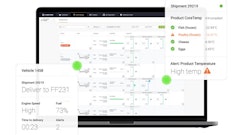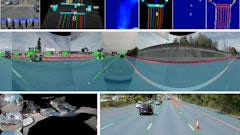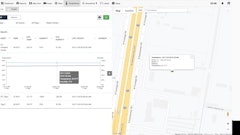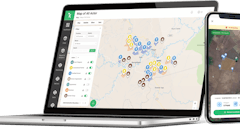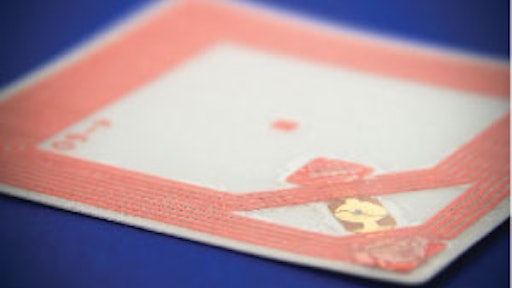
When Wal-Mart Stores, Bentonville, AR, announced in June 2004 that is was going to require its top suppliers to use RFID technology, the retail and food industries were abuzz. After all, where Wal-Mart goes, so goes everyone else.
But just how much adoption has RFID technology had in the food industry to date? That's a subject that is open to debate and much depends on whom you ask. Some third-party logistics providers (3PLs) and public refrigerated warehouses (PRWs) are embracing the technology by establishing test labs. Others are taking a wait-and-see attitude. And still others are actively using the technology with key customers and suppliers and beginning to take stock in the results.
Benjamin Milk from the International Association of Refrigerated Warehouses (IARW), Alexandria, VA, says that member companies are following the technology closely. "We have called on a number of RFID specialists and experts to talk with members about RFID issues on a number of occasions over the past three years," he says. "In fact, at the World Food Logistics Organization Institute, the annual industry training program, we are presenting an IT module with significant discussion about RFID."
Still, Milk says, many member companies have yet to hear from customers that RFID is a technology they want at this time.
"Most customers aren't asking for it yet," he explains. "Right now, RFID seems to be driven by a few large companies, and those that are using it are doing so on a limited basis. Suppliers to these companies may do it for one or two accounts, but that's about all we're seeing right now."
That speaks volumes about where RFID adoption stands right now in the PRW industry, because it is a customer-driven industry. "PRWs invariably respond to customer requests and are pro-active in anticipating what that might be," Milk says. "There just hasn't been significant customer demand yet. It's almost a technology looking for an application."
This certainly applies to Milwaukee-based Total Logistics Control Inc. (recently acquired by Supervalu), where Carl Melville says the company has yet to delve into RFID. "We haven't had any customers asking for the technology yet," he says. "We are customer driven, so we are taking a 'wait-and-see' attitude."
Who's Doing What
In spite of the fact that RFID hasn't received widespread adoption in the PRW industry yet, there are companies that have put it into place with good results. United States Cold Storage (USCS), Cherry Hill, NJ, has been accumulating RFID information and technology for the past two or three years, according to Jerome Scherer, vice president of sales and marketing. In fact, about a year ago, the company established an RFID Solution Center in Dallas to help its supplier customers meet their supply chain mandates.
The USCS center, which it established in conjunction with Teaneck, NJ-based Cognizant Technology Solutions, serves as a fully functioning, end-to-end RFID distribution center. The technology in place incorporates printers, label applicators, conveyors, readers, testing devices, links to warehouse management systems and a variety of middleware linked to support live customers and test scenarios in RFID technology.
USCS is actively marketing its RFID center to customers and has been providing complete RFID services to one major customer for about six months. "We are selecting multiple SKU orders from inventory that require RFID tags," says Scherer. "We are writing the tags, applying the tags, testing the tags and shipping the orders with ASN confirmations via EDI to the shipper and to the consignee."
So far, the results have been promising, says Scherer. "Our accuracy and performance is approaching 100 percent for reading labels on outbound orders," he comments.
C.H. Robinson Worldwide, Eden Prairie, MN, is another 3PL company that is testing and using RFID with its customers. "We began by assembling an internal team focused on RFID in 2004," says Mike Ralston, general manager. "We partnered with one of our produce suppliers and put a test facility together in the produce receiving area."
This past fall, C.H. Robinson added another supplier to its RFID roster, this time a citrus company that packs produce for many of C.H. Robinson's retail customers. C.H. Robinson tags the cases and pallets of citrus as they head out of the company's distribution centers for the retail giant.
The C.H. Robinson testing facility is fully functioning and available to produce growers that need to comply with partner mandates. "We've been able to learn how to position the tags, how the hardware and software works, and how to set up RFID processes," says Ralston. "These are all grassroots activities on our end."
Ralston says that C.H. Robinson was proactive in testing RFID because it could "see the benefits of knowing where products are and smoothing out the flow of data and goods." RFID, he says, "gives you more data about movement."
Also jumping on the RFID bandwagon is Lakeland, FL-based Saddle Creek Corp., which has been involved with the technology for the past two to three years. "We currently have several accounts that supply Wal-Mart, so we have partnered with them to come up with compliance labeling," says Randy Burdick, Saddle Creek's manager of special projects. "We have created a system where we can pull out a product, tag it and create the appropriate paperwork."
Burdick says that Saddle Creek's customers have driven the RFID process. "They have selected the RFID vendors and we have provided the operational experience to them," he says. "In each case, we have created labs to test the tags and system and then began with a small start-up."
Currently, Burdick says that a very small percentage of Saddle Creek's customers—just 2.5 percent—are involved with RFID. But those customers have benefited by maintaining their relationships with Wal-Mart, as well as making other gains. "We've seen productivity gains and picking accuracy has improved also," he explains. "It's tough to measure, however, because we still have such a small sampling to work with."
The Future
All of the companies that have begun RFID programs expect to expand them in the future. "We will expand our RFID solution centers nationwide based on customer demand," says Scherer of USCS. "We also intend to use RFID technology within our facilities to improve our operational efficiencies."
Ralston says that C.H. Robinson will continue to advance its RFID services as the technology improves. "The new technology is getting better and better all the time," he says. "We will continue to audit and interview hardware and software providers as we progress."
C.H. Robinson is expanding its testing across categories to address a variety of process issues as well. The company is very supportive of the technology as a way to improve business processes. "The more knowledgeable you are about the supply chain and where your goods are, the better," he says. "It's a smarter way to do business."
Saddle Creek also has plans for the future with RFID. "We are looking at developing RFID solutions that go beyond client-specific applications that we can share with different clients," says Burdick. "We've had the benefit of seeing what different equipment can do so we plan to pick the best of the solutions and integrate them into one package we can offer to all our clients."
The company continues to hear from clients interested in RFID, and it stands ready to move forward with those who request it. "Right now it works well for electronic proof of delivery," says Burdick, "but we will continue to look for other areas where we can apply it."
Clearly, the amount of RFID use in the PRW industry remains all over the board. For those still standing on the sidelines, though, a time to get into the game can't be far off.
Whatever the future holds for RFID in the food supply chain, the PRW industry will be prepared, according to IARW's Milk. "PRW companies are well aware of RFID developments, benefits, shortcomings and challenges," he says. "They are watching RFID trends and applications and they stand ready to do whatever is needed to meet the RFID needs of their customers."








